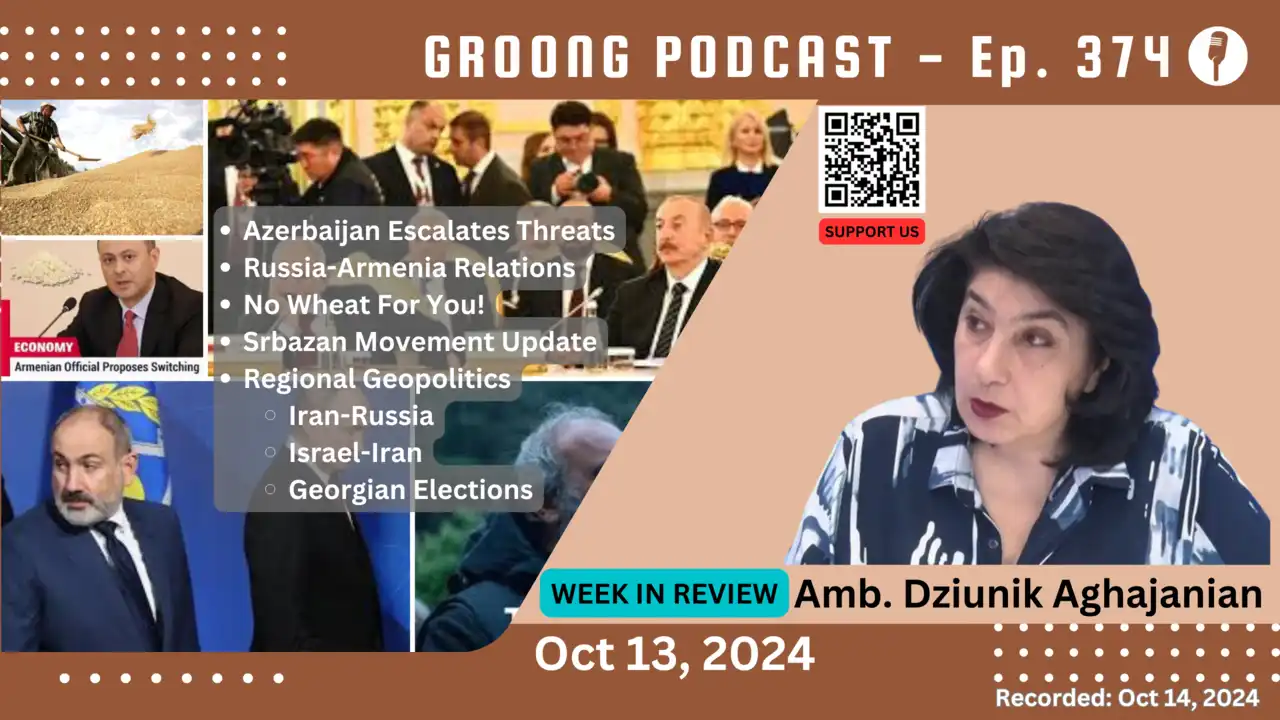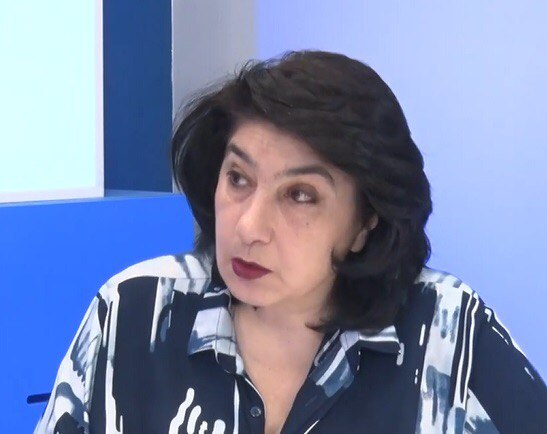Dziunik Aghajanian - Azerbaijan Escalates Threats, Russia-Armenia Relations, Eat Rice, Not Wheat, Have Some Cold Winters, Srbazan Movement Update, Regional Geopolitics, Georgian Elections | Ep 374 - Oct 13, 2024 [EP374]
Posted on Tuesday, Oct 15, 2024 | Category: Armenia, Azerbaijan, Borders, Georgia, Middle East, Iran | Series: wir
Groong Links:
Guest:
Topics:
- Azerbaijan Escalates Threats
- Russia-Armenia Relations
- Eat Rice, not Wheat, Have some Cold Winters!
- Srbazan Movement Update
- Regional Geopolitics
- Iran-Russia
- Israel-Iran
- Georgian Elections
Episode 374 | Recorded: October 14, 2024
Show Notes
Topics This Week
Azerbaijan Escalates Threats
Azerbaijani MOD held an official meeting, involving major divisions and leadership of their armed forces. The message communicated through their announcement was “to be ready to take preventive measures against all possible provocations of revanchist forces on the conditional border”.
That Azerbaijan is building up and getting ready for some kind of provocation is beyond doubt. But experts we’ve previously talked to say that Azerbaijan would not go for such a move preceding or during COP29 which is planned to be held in Baku between Nov 11 - 22, due to reputational concerns.
While threats from Azerbaijan may appear to be a regular occurrence, we know that such meetings and announcements have in the past coincided with major periods of escalation. For instance, right before the 44-day war in 2020, and also before the ethnic cleansing of Artsakh in September 2023.
Questions:
- What is the purpose of Azerbaijan’s escalation of tensions?
- Is it possible that Azerbaijan may use the time preceding COP29 as a smokescreen to make a land grab?
About 10 days ago the constitutional court published a decision that the Declaration of Independence does not amount to law, and therefore did not present a territorial claim on Azerbaijan. Azerbaijan was quick to rebuff the decision and deemed it unsatisfactory, and renewed its demand for Armenia to change its constitution.
Question:
- Could this current round of escalation and threats be a reaction to that decision?
Pashinyan is presenting the demarcation and delimitation plan as Armenia’s “land deed”. Every Armenian government official was saying that with the signing of the Demarcation and Delimitation principles, Azerbaijan would agree to the de-facto borders of the Soviet Armenian republic, repeatedly bringing up Alma Ata.
Yet, while the agreement has not even been ratified yet, Azerbaijan began downplaying the significance of the Alma Ata declaration. The spokesperson of the Azerbaijani MFA said: “The Alma-Ata Declaration has nothing to do with the question of where the borders of CIS member states lie and which territories belong to which country”
Question:
- Who is right and who is wrong? And does it really matter if Azerbaijan is explicitly saying that the Alma Ata declaration means nothing in the context of borders?
Russia - Armenia Relations
Pashinyan in Moscow
Last weekend, on October 7 and 8, Both Pashinyan and Aliyev were in Moscow for the Commonwealth of Independence States (CIS) summit. Both of them met with Putin separately.
Official Russian state media shared (and then later removed) unflattering images of Pashinyan, including an image where Aliyev and Lukashenko look like they’re having a serious discussion while Pashinyan was in the background mucking around with his espresso cup, trying hard to get the last drop in his mouth. Another image showed Pashinyan looking down next to the Azerbaijani flag.
Upon his return, Pashinyan’s office announced that Russian border guards would withdraw from their duties on the Armenian-Iranian border, and Armenia’s border guard service would assume that responsibility. Additionally, it was mentioned that Armenia would begin to participate in the border guard duties with Russia, along the Armenian-Turkish border.
Questions:
- What was the Kremlin trying to communicate through its media? How was the coverage of Pashinyan in general?
- What else was on the agenda of the Pashinyan-Putin meeting?
- What was on the Putin-Aliyev meeting agenda?
A trilateral Putin-Pashinyan-Aliyev meeting did not take place, reportedly because Pashinyan declined. And after Pashinyan’s visit to Moscow, various Russian officials made statements relevant to Armenia. For example, Alexei Overchuk stated that Russia must have a key role in the opening of Armenian-Azerbaijani transportation links; both Baku and Moscow expressed renewed concern about the EU MIssion in Armenia (EUMA).
Questions:
- What is the purpose of the Azerbaijani criticism of the EU Mission in Armenia, what are they trying to achieve?
- Note: The Chief of the General Staff of the Armed Forces of Azerbaijan, Kerim Veliyev, complained to the Director of the International Military Staff of NATO, Janush Adamchuk in Baku that the presence of the EU observation mission on the territory of Armenia “further aggravates the situation”.
- Has the EUMA been a beneficial presence for Armenia?
- It’s pretty clear that, similar to New York and with Blinken a couple of weeks ago, nothing was achieved in Moscow and Putin. Are talks between Armenia and Azerbaijan stalled?
Eat Rice, Not Wheat (and have some cold winters!)
In a conference organized by the Civil Contract party, titled “Crossroads of Peace”, Armen Grigoryan recently revealed some more information on what was discussed at the April 5 meeting in Brussels between Blinken, Von Der Leyen and Pashinyan. Apparently food security was on the table (no pun intended).
In his speech, Grigoryan casually talks about diversifying away from Armenia’s reliance on Russian wheat, by moving to rice instead. This is reminiscent of the remark from Dan Baer that Armenia should be prepared to endure some “cold winters”.
Background notes from journalist Sevak Hakobyan’s post:
- Armenia imports 70 percent of wheat
- Our self-sufficiency is about 30 percent
- Armenia annually received about 70 thousand tons of wheat from Artsakh, which is 12-15 percent of demand, before Pashinyan transferred Artsakh to Azerbaijan
- 95% of wheat imported to Armenia comes from Russia (about 370,000 tons per year)
- Armenia is straining relations with Russia, and from there they warn that you have problems with wheat, do not “buzz” the one who feeds you
- The Minister of Economy of Armenia says that it is unprofitable to grow wheat in Armenia
- Secretary of the Security Council Armen Grigoryan states that Armenia may switch from wheat to rice in order to prevent others (meaning Moscow) from targeting our strategic goods.
Questions:**
- How can something so important be talked about so nonchalantly?
- In the background of the constant alienation of Russia, is there any evidence that Armenia is serious about these moves?
- Armenia’s dependence on Russia has skyrocketed in recent years! What about other segments of the economy? Is there any sign of diversification or is Armenia sleepwalking into very, very cold winters for the years to come?
Srbazan Movement
Points:
- The Srbazan movement restarted its activity
- Two protests held so far
- Demanded that the prosecution try Pashinyan and other Armenian government members for crimes related to ethnic cleansing of Artsakh
- I believe that Dziunik is an active participant (and also part of the diplomatic council, that is the “unofficial” foreign policy support team for the Srbazan)
Questions:
- Is the movement restarting as expected so far?
Mikayel Srbazan said that the reason the movement is faltering is because of the “shadow” of Robert Kocharyan and Serzh Sargsyan
- Various opposition figures attacked Mikayel Srbazan
- Bagrat Srbazan defended Mikayel Srbazan from the attacks, but avoided addressing Mikayel Srbazan’s comments about the former presidents
Questions:
- What are your thoughts about Mikayel Srbazan’s statements? Should Bagrat Srbazan have addressed the claims directly rather than simply defending Mikayel Srbazan?
Regional Geopolitics
Iran - Russia Relations
Pezeshkian and Putin met in Turkmenistan on Friday. This seems to have been scheduled at the last minute ahead of the BRICS summit in Kazan where it is anticipated that a new strategic partnership agreement is planned to be signed. Putin said: “our assessments of current events in the world are often very close”
Questions:
- What are areas that Russia and Iran disagree on?
Likelihood of a Major Israeli Attack on Iran
Points:
- Phone call between Nethanyahu and Biden leads to cancellation of trip by Gallant.
Questions:
- Could Yom Kippur (holiest of Jewish holidays) have delayed Israel’s plans
- How likely is a major attack?
- What will be Azerbaijan’s role in this scenario?
- What dangers does it pose for Armenia?
Parliamentary Elections in Georgia
We’ve heard and talked a lot about the parliamentary elections in Georgia in two weeks. As the ruling party Georgian Dream has passed laws that the West doesn’t like, and has struck a neutral path in foreign affairs throughout the course of a very turbulent geopolitical world atmosphere in the past 3 years, the West has painted these elections in very dire terms as if they will be the end of democratic Georgia.
Questions:
- What happens if Georgian Dream (GD) wins? What happens if it loses?
- How realistic are some predictions that Russia might try to pry Georgia away from the West by enticing it into a confederation with South Ossetia and Abkhazia?
- Can a possible GD victory affect internal politics in Armenia?
- By making European aspirations look even more ridiculous?
Thoughts from the Participants
- Dziunik: The loss of joy among the people in Armenia.
- Hovik: Stay active demanding the return of our POWs and hostages in Baku.
- Civil Contract party meeting attended by a large coterie of foreign-funded NGOs and dignitaries.
Wrap-up
That’s our Week in Review, we hope you found it helpful. We invite your feedback and your suggestions, you can find us on most social media and podcast platforms.
Thanks to Laura Osborn for the music on our podcasts.
Guests

Dziunik Aghajanian
Ms. Dziunik Aghajanian has served Armenia through the ranks of the Ministry of Foreign Affairs, and most recently as a diplomat, as Armenia’s Ambassador to such countries as the Netherlands, Malaysia, and Indonesia. She received her education at Yerevan State University, Columbia University in NY, and Uppsala University in Sweden.
Hosts

Hovik Manucharyan
Hovik Manucharyan is an information security engineer who moved from Seattle to Armenia in 2022. He co-founded the ANN/Groong podcast in 2020 and has been a contributor to Groong News since the late 1990s.
Disclaimer: The views expressed by Hovik Manucharyan on the ANN/Groong podcast are his own and do not necessarily reflect the opinions of his employer or any other organization.

Asbed Bedrossian
Asbed Bedrossian is an IT professional, and for years oversaw the central IT enterprise infrastructure and services at USC. His decades of experience spanned across IT strategy, enterprise architecture, infrastructure, cybersecurity, enterprise applications, data center operations, high performance computing, ITSM, ITPM, and more.
Asbed founded the Armenian News Network Groong circa 1989/1990, and co-founded the ANN/Groong podcast in 2020.